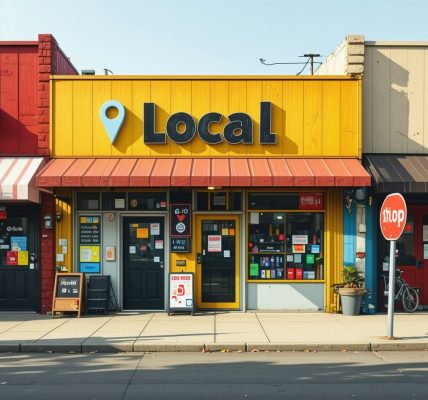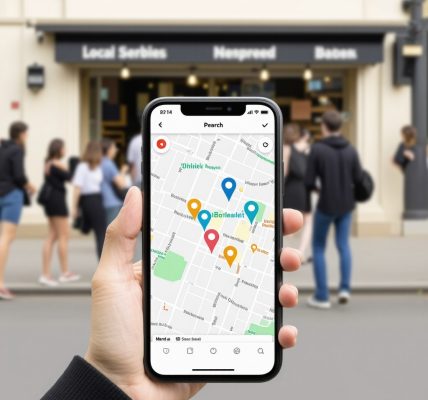Understanding Hyperlocal SEO: The Key to Local Visibility
In today’s digital landscape, businesses strive to connect with their local communities effectively. This is where hyperlocal SEO comes into play, a specialized segment of search engine optimization focused on enhancing a business’s visibility within its immediate geographical area. By tailoring your online presence to cater to local customers, you not only improve your rankings on search engines but also foster stronger community relationships.
Hyperlocal SEO is not just about targeting a wider audience; it’s about being visible to those who matter the most—your neighbors. This approach emphasizes local search queries, ensuring that your business appears prominently for users searching for services or products in your area. For instance, if someone types “best coffee shop near me,” a well-optimized business will show up in their search results.
The Importance of Local Listings and Google My Business
To succeed in hyperlocal SEO, optimizing your Google My Business listing is crucial. This free tool allows you to manage how your business appears in search results and on Google Maps, making it easier for potential customers to find you. Accurate and detailed information about your business, including your address, phone number, hours of operation, and services offered, can significantly impact your visibility.
Furthermore, maintaining consistency across all local listings is vital. Ensure that your business name, address, and phone number (often referred to as NAP) are the same across various platforms. This consistency helps search engines verify your business’s legitimacy and improves your chances of ranking higher in local search results. For more insights on managing your online presence, check out our guide on GMB SEO Audit, which delves into essential practices for local search performance.
Leveraging Local Keywords for Enhanced Visibility
Another critical aspect of hyperlocal SEO is incorporating local keywords into your website content. These keywords should reflect the language your potential customers use when searching for your services. Utilizing tools like keyword research tools can help you identify the most effective terms to target. For example, instead of just using “Italian restaurant,” consider phrases like “Italian restaurant in [Your City]” or “best Italian food near [Your Neighborhood].” This specificity not only boosts your SEO but also aligns your content with the search intent of local consumers.
Moreover, creating content that addresses local events, news, or activities can enhance your relevance and authority in the area. Engaging with the community through blog posts or social media updates fosters trust and encourages customer interactions, which can ultimately lead to increased foot traffic and online inquiries.
Building Local Citations and Backlinks
Establishing local citations is another effective strategy for boosting your hyperlocal SEO efforts. A citation is any online mention of your business name and address, even if there is no link back to your site. These citations can appear in local business directories, websites, and social media platforms. Consistent citations across various platforms not only increase your credibility but also improve your chances of being found by potential customers. Check out our post on GMB Citation Management for more tips on enhancing your local SEO through effective citation practices.
Utilizing Google My Business Posts for Local Engagement
One effective way to enhance your hyperlocal SEO efforts is by utilizing Google My Business posts. These posts allow you to share updates, promotions, and events directly on your business listing. By regularly posting engaging content, you can capture the attention of local consumers and encourage them to interact with your brand.
Regular updates keep your customers informed and help improve your visibility in local search results. Google prioritizes businesses that actively engage with their audience, so make sure to showcase your unique offerings or special events. Additionally, incorporating local keywords into your posts can further enhance your SEO performance.
Enhancing Your Business Description for SEO
Your business description plays a crucial role in local search optimization. Crafting a compelling and informative Google My Business business description can help potential customers understand what you offer and why they should choose you over competitors. Focus on including key services, your unique selling proposition, and relevant keywords that resonate with local search intent.
Moreover, ensure your description is concise and engaging. This not only helps with SEO but also captures the attention of users browsing through search results. Remember to keep the description updated as your business evolves, reflecting any changes in services or offerings.
Monitoring Your Local SEO Performance
Tracking your hyperlocal SEO performance is essential to understand what strategies are working and where improvements are needed. Utilizing tools like Google Analytics and Google Search Console can provide valuable insights into your website traffic and search rankings. By analyzing this data, you can make informed decisions to optimize your local SEO efforts further.
Furthermore, consider conducting regular GMB SEO audits to evaluate your Google My Business performance. This process involves reviewing your listing for accuracy, checking for missing information, and assessing customer engagement metrics. Regular audits can help identify areas for improvement, ultimately boosting your local search visibility.
Engaging with Customer Reviews
Customer reviews are a powerful component of hyperlocal SEO, influencing potential customers’ decisions and your search rankings. Actively engaging with reviews—both positive and negative—can enhance your business’s credibility and build trust within your community. Responding to reviews shows that you value customer feedback and are committed to providing excellent service.
For more on best practices for managing reviews, check out our article on GMB Review Generation. Implementing a strategy for encouraging customer reviews can significantly improve your online reputation and local SEO performance.
Leveraging Social Media for Local Visibility
Don’t overlook the power of social media in your hyperlocal SEO strategy. Platforms like Facebook, Instagram, and Twitter can be instrumental in promoting local content and engaging with your community. Sharing posts that highlight local events or collaborations can attract local followers and drive traffic to your website.
Additionally, integrating your local SEO efforts with social media marketing can create a cohesive online presence that resonates with your target audience. Use hashtags and geotags to increase your visibility in local searches, making it easier for potential customers to discover your business.
Engaging Your Community with Google My Business Features
To truly excel in hyperlocal SEO, leveraging the full suite of features offered by Google My Business is essential. Beyond basic listing optimization, tools such as Google Posts allow businesses to share timely updates and promotions that resonate with local customers. Regularly posting engaging content not only keeps your audience informed but also signals to Google that your business is active, which can positively impact your search rankings.
Consider crafting posts that showcase new products, special offers, or local events that you’re participating in. Using a mix of text, images, and videos can enhance the appeal of your posts. Always remember to include relevant local keywords to boost their visibility.
Utilizing Customer Interaction to Build Relationships
Customer interactions through Google My Business can significantly enhance your local SEO. Responding promptly to questions and reviews demonstrates your commitment to customer service and helps build trust within your community. When potential customers see that you engage with your audience, they are more likely to choose your business over competitors.
For more strategies on managing reviews, check out our article on GMB Review Generation. This resource outlines effective practices for encouraging customer feedback and highlights the importance of actively managing your online reputation.
Optimizing Your Business Attributes for Better Visibility
Another vital aspect of your Google My Business profile is the accurate listing of business attributes. These attributes can include features like outdoor seating, wheelchair accessibility, or Wi-Fi availability. By providing detailed attributes, you not only enhance user experience but also target specific customer preferences. This can be particularly beneficial for local searches, as users often filter their results based on these attributes.
Ensure that you regularly update these attributes to reflect any changes in your services or offerings. This practice not only aids in SEO but also ensures that customers have the most accurate information when making decisions.
Creating Localized Content for Enhanced Engagement
Local content creation is a powerful strategy to boost your hyperlocal SEO efforts. By writing blog posts or creating videos that focus on local events, news, or activities, you can position your business as a community leader. This not only attracts local customers but also improves your website’s authority in local searches.
Consider collaborating with local organizations or influencers to broaden your reach. Engaging with local news outlets for features or partnerships can also drive more traffic to your site. For more insights on optimizing your content for local searches, check out our guide on Local Search Engine Optimization Tips.
Utilizing Social Media to Amplify Your Local Presence
Integrating social media with your Google My Business strategy can further enhance your local visibility. By sharing your Google Posts on platforms like Facebook and Instagram, you can reach a wider audience and engage with your community more effectively. Use local hashtags to connect with your target market and encourage user-generated content that promotes your brand.
Moreover, running social media campaigns that direct followers to your Google My Business profile can increase your engagement and drive more traffic. Focus on creating shareable content that resonates with local audiences to maximize your impact.
Enhancing Local Engagement through Hyperlocal SEO
To truly leverage the power of hyperlocal SEO, businesses must focus on enhancing local engagement. This entails not only optimizing online presence but also actively participating in community activities and fostering relationships with local customers. By embedding your business within the local fabric, you can significantly boost your visibility and credibility.
Participating in Local Events and Sponsorships
Engaging in local events or sponsoring community initiatives can provide excellent opportunities for visibility. These activities allow you to connect with potential customers in person, showcasing your commitment to the community. Consider sponsoring local sports teams or participating in festivals. This not only enhances brand recognition but also gives you content to share on your Google My Business, further promoting your involvement in the area.
Building Relationships with Local Influencers
Collaborating with local influencers can amplify your reach and credibility. Influencers often have established trust with their audience, and by partnering with them, you can tap into their follower base. Whether through social media shoutouts or collaborative events, influencer partnerships can create buzz around your business. For effective strategies on leveraging local influencers, consider exploring local SEO tips that can enhance your outreach.
Creating Compelling Local Content
Content creation is a vital part of any hyperlocal SEO strategy. Producing localized content that resonates with your community can drive engagement and improve search rankings. Focus on topics that reflect local interests, events, or issues. This approach not only attracts local traffic but positions your business as a thought leader in your area.
Incorporating Local Keywords into Your Content Strategy
When generating content, it’s crucial to incorporate local keywords effectively. Use tools to identify keywords relevant to your area and industry, and weave these naturally into your blog posts, articles, and website pages. Phrases like “best pizza in [Your City]” or “affordable plumbing services near [Your Neighborhood]” can enhance local search visibility. For more insights on keyword optimization, check out our guide on keywords strategy.
Engaging Storytelling to Attract Local Customers
Storytelling can be a powerful tool in your marketing arsenal. Share stories about your business journey, customer experiences, or the history of your location. These narratives can create emotional connections and foster loyalty among local customers. Consider blogging about local initiatives you support or sharing testimonials from community members. This not only boosts engagement but also enhances your Google My Business profile by showcasing your community involvement.
Utilizing Reviews for Enhanced Local Visibility
Customer reviews play a significant role in local SEO and can drastically influence potential customers’ decisions. Encouraging satisfied customers to leave positive reviews can improve your online reputation and search rankings. Actively responding to these reviews demonstrates your commitment to customer satisfaction and can foster trust.
Best Practices for Review Generation
To effectively generate reviews, implement strategies that encourage feedback. After a purchase or service, send follow-up emails thanking customers and politely requesting a review. Make it easy for them by providing direct links to your Google My Business listing. Your proactive approach not only boosts your local SEO but also enhances customer loyalty.
Monitoring and Responding to Customer Feedback
Regularly monitor your reviews and feedback across various platforms. Responding promptly to both positive and negative feedback shows that you value customer opinions. This engagement can enhance your business’s credibility and encourages potential customers to choose your services over competitors.
Comprehensive FAQ Section on Hyperlocal SEO
What is hyperlocal SEO?
Hyperlocal SEO is a specialized form of search engine optimization that focuses on optimizing a business’s online presence to attract local customers within a specific geographical area. It involves using local keywords, managing Google My Business listings, and engaging with the community to improve visibility in local search results.
How can I optimize my Google My Business listing?
To optimize your Google My Business listing, ensure that all your business information is accurate and consistent across all platforms. This includes your business name, address, phone number (NAP), and hours of operation. Regularly update your listing with posts about promotions or events and encourage customers to leave reviews.
What are local keywords and why are they important?
Local keywords are search terms that include specific geographical locations along with the primary keyword. For example, instead of just targeting “pizza,” you might target “pizza in [Your City]”. These keywords are crucial for hyperlocal SEO because they help align your content with the search intent of local customers, improving your chances of ranking higher in local search results.
How do customer reviews affect local SEO?
Customer reviews significantly impact local SEO by influencing search rankings and customer trust. Positive reviews can enhance your business’s credibility and attract more customers. Engaging with reviews—both positive and negative—demonstrates your commitment to customer satisfaction and can improve your local search visibility.
What are local citations and how do they help?
Local citations are online mentions of your business’s name, address, and phone number (NAP) across various directories and platforms. Consistent citations help search engines verify your business’s legitimacy and improve your chances of ranking higher in local search results. They can also enhance your credibility with potential customers.
How can social media support hyperlocal SEO efforts?
Social media can support your hyperlocal SEO efforts by promoting local content and engaging with your community. Sharing posts that highlight local events or collaborations can attract local followers and drive traffic to your website. Integrating your social media marketing with local SEO strategies creates a cohesive online presence.
What types of content work best for hyperlocal SEO?
Content that addresses local events, news, or activities works best for hyperlocal SEO. Blogging about community initiatives, local partnerships, or relevant local topics can position your business as a community leader, attract local customers, and improve your website’s authority in local searches.
How often should I monitor my local SEO performance?
You should regularly monitor your local SEO performance to evaluate the effectiveness of your strategies. Using tools like Google Analytics and Google Search Console, analyze your website traffic, search rankings, and customer engagement metrics. Conducting regular GMB SEO audits will help you identify areas for improvement and optimize your local search visibility.
Authority Resources for Hyperlocal SEO
For further insights and expertise on hyperlocal SEO, consider these trusted resources:
- Moz – The Beginner’s Guide to Local SEO
- Search Engine Journal – Local SEO 101
- Search Engine Watch – How to Improve Local SEO for Small Businesses
- BrightLocal – Local SEO Learning Hub
- Neil Patel – Local SEO: The Ultimate Guide
Conclusion
In conclusion, mastering hyperlocal SEO is essential for businesses aiming to enhance their local visibility and engage effectively with their communities. By optimizing your Google My Business listing, leveraging local keywords, and actively participating in community initiatives, you can significantly improve your local search rankings and foster stronger customer relationships. Remember, the goal is not just to be found online but to connect with and serve your local customers better. Implement these strategies to position your business at the forefront of local search results, driving both online and foot traffic to your establishment.



This post highlights the critical role of Google My Business and local keywords in boosting community visibility. In my experience managing a local boutique, I found that consistent NAP info across all listings truly makes a difference. Additionally, engaging actively through GMB posts and responding to reviews has helped us build trust and attract loyal customers. I do wonder, how often should small businesses realistically update their GMB profile to maintain a competitive edge without it feeling overwhelming? I’ve seen some success with weekly updates, but I’m curious what others have found sustainable. Also, incorporating local events into content marketing seems to be a strong strategy for regional relevance. Has anyone experimented with creating local-specific blog series or partnerships that resulted in measurable SEO benefits? I’d love to hear what kind of localized content has worked well for different types of businesses, as well as some practical tips for maintaining an active online presence without stretching resources too thin.